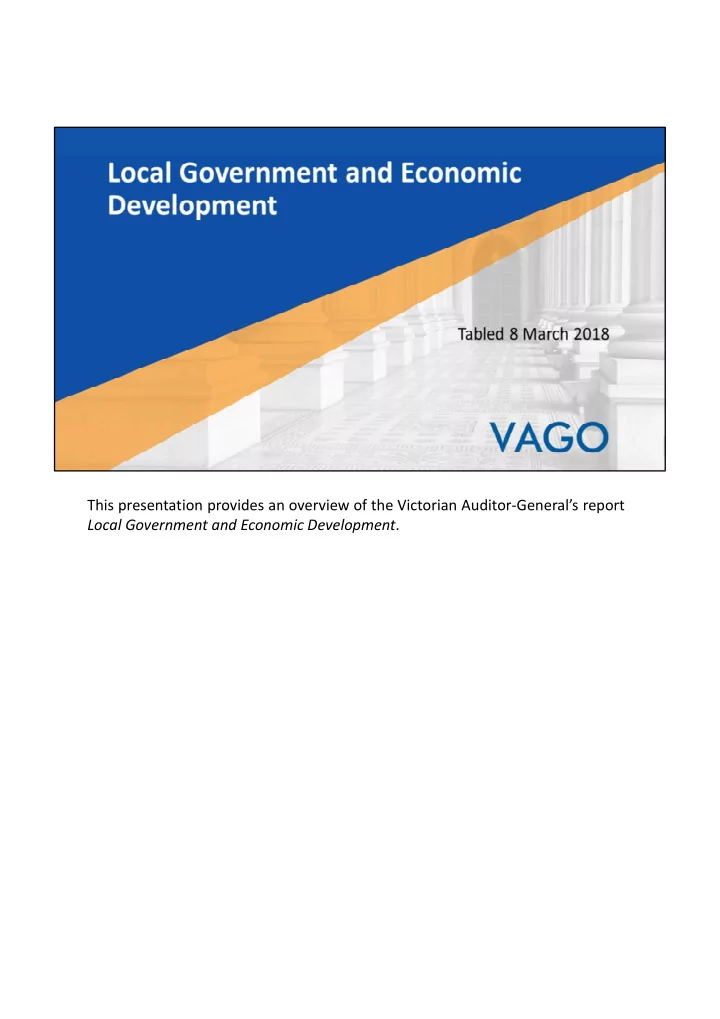

This presentation provides an overview of the Victorian Auditor ‐ General’s report Local Government and Economic Development .
Local economic development aims to build up the economic capacity of an area to improve the quality of life for residents. Local councils play an important role in creating long ‐ term economic development strategies and suitable conditions for economic development.
The audit looks at whether local councils’ economic development activities improve the economic viability and sustainability of their municipalities. Our focus was on regional and rural councils because they face greater challenges in economic development.
The councils we audited were Bass Coast Shire Council, Corangamite Shire Council, Loddon Shire Council, Melton City Council and Southern Grampians Shire Council. We also examined the roles of Regional Development Victoria (RDV)—a statutory agency within the Department of Economic Development, Jobs, Transport and Resources—and Local Government Victoria (LGV), which is part of the Department of Environment, Land, Water and Planning in assisting councils to facilitate local economic development.
Councils have taken effective steps towards developing well ‐ aligned economic strategies that complement the government's regional priorities. However, they often fall short of realising their intended economic development outcomes, often due to the following systemic issues: other agencies, such as those providing utility infrastructure and roads, have • competing or conflicting priorities when it comes to land use planning there is a lack of resources and relevant skills to access available grants, • which rural and smaller councils in particular depend on for funding economic development activities the four ‐ year council plans are at odds with the longer ‐ term view needed for • economic development strategies, which often results in poorly aligned and changing priorities, and there is a lack of targets or benchmarks against which to gauge progress, as • well as poor links between project reporting and outcome monitoring.
Victoria's 79 councils are grouped into 15 partnerships—six metropolitan and nine regional partnerships, as illustrated on this map.
As shown in the graph on this slide, economic growth across partnership groups varies, ranging from an average gross regional product decline of 11 per cent for the Mallee group councils to an average increase of 34 per cent in the Western group.
A locality's economic growth keeping pace with—or exceeding—its population growth is a positive indicator of economic development. As the chart on this slide illustrates, from 2007 to 2016, gross regional product growth has not kept pace with population growth in 50 of the 79 Victorian councils.
We found that economic development was a focus for all audited councils. All audited councils had economic development strategies that aligned with state and regional priorities. The five audited councils have all established teams who are responsible for economic development. There was also evidence of robust engagement with all relevant stakeholders at the local level.
We identified several areas that councils could improve: • There is a potential for councils to use better data while doing economic assessments. • Audited councils made limited use of their powers, including entrepreneurial powers and the power to declare special rates and charges. • Councils did not clearly align performance of economic development actions with identified strategic outcomes. • Some of the audited councils lack targets and benchmarks for their economic development outcomes.
One of the opportunities that exists for regional councils to promote economic development in their municipality is to access funds from the Regional Jobs and Infrastructure Fund (RJIF). RJIF is administered by RDV and is the Victorian Government’s overarching regional development package. As part of its election commitments, the Victorian Government committed $100 million through the Regional Infrastructure Fund — a component of RJIF — to regional cities and $70 million to rural councils. By December 2017, only $30 million (less than 50 per cent) of the rural council allocation was committed, with $24.3 million worth of projects in varying stages of approval.
For the four rural councils in this audit, RDV identified $8.5 million in grants for which councils had either not applied, or had applied but failed to meet the funding criteria as of December 2017. This was for 40 potential projects valued at more than $46.5 million.
We made a total of eight recommendations including three for RDV, two for RDV and LGV, and three for councils. All agencies have accepted the recommendations.
For further information, please see the full report of this audit on our website, www.audit.vic.gov.au.
Recommend
More recommend